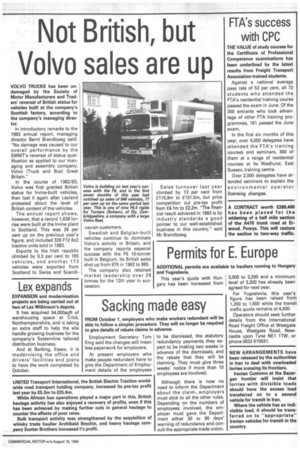Not British, but
Page 7

If you've noticed an error in this article please click here to report it so we can fix it.
Volvo sales are up
VOLVO TRUCKS has been undamaged by the Society of Motor Manufacturers and Traders' reversal of British status for vehicles built at the company's Scottish factory, according to the company's managing director.
In introductory remarks to the 1983 annual report, managing director Bernt Brandtzaeg said: "No damage was caused to our overall performance by the SMMT's reversal of status qualification as applied to our managing and assembly company, Volvo (Truck and Bus) Great Britain."
In the course of 1982/83, Volvo was first granted British status for Irvine-built vehicles, then lost it again after Leyland protested about the level of British content of the vehicles.
The annual report shows, however, that a record 1,639 lorries were built at the Irvine plant in Scotland. This was 28 per cent up on the previous year's figure, and included 326 F12 6x2 tractive units sold in 1983.
Exports to the Irish republic climbed by 9.3 per cent to 165 vehicles, and another 173 vehicles were exported from Scotland to Swiss and Scandi navian customers.
Swedish and Belgian-built vehicles continue to dominate Volvo's activity in Britain, and the company reports especial success with the F6 16-tonner built in Belgium. Its British sales shot up from 675 in 1982 to 985.
The company also retained market leadership over 28 tonnes for the 12th year in succession.
Sales turnover last year climbed by 13 per cent from £115.9m to £131.5m, but price competition cut pre-tax profit from £4.1m to £2.2m. "The financial result achieved in 1983 is by industry standards a good pointer to our well-established business in this country," said Mr Brandtzaeg.








































































